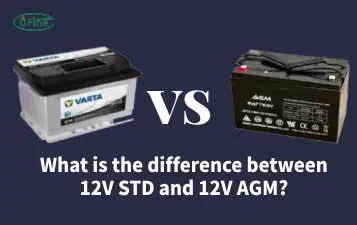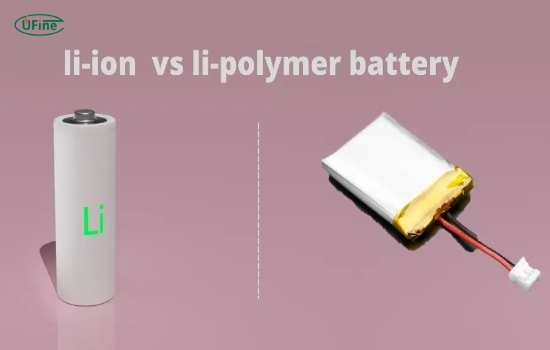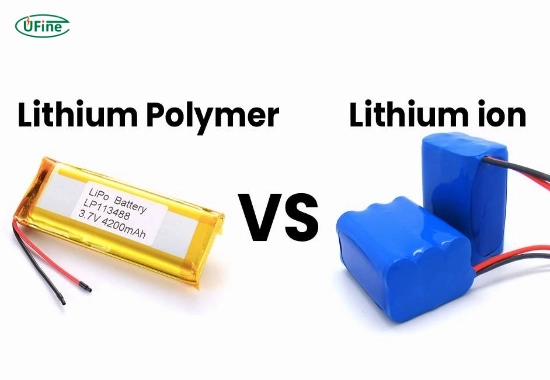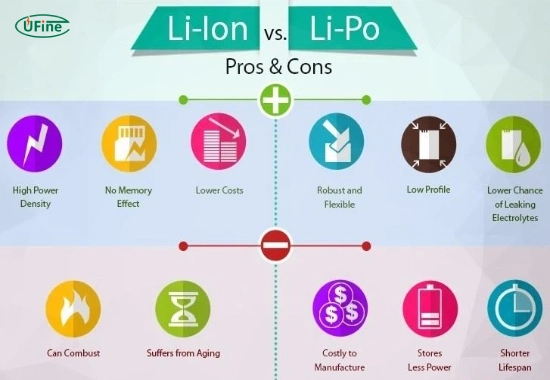
- Li-ion vs LiPo battery: What’s the difference?
- Is lithium-ion better than lithium polymer?
- Part 1. What is a lithium battery?
- Part 2. Are lithium-ion and lithium polymer batteries the same?
- Part 3. Lithium-ion battery advantages
- Part 4. Lithium-ion battery disadvantages
- Part 5. Lithium polymer battery advantages
- Part 6. Lithium polymer battery disadvantages
- Part 7. Li-ion vs LiPo: Which performs better in real use?
- Part 8. Lithium-ion vs Lithium polymer: Key differences
- Part 9. Li-ion vs LiPo: Which battery should you choose?
- Part 10. FAQs about lithium polymer vs lithium-ion batteries
- Part 11. Conclusion
Li-ion vs LiPo battery: What’s the difference?
Lithium-ion (Li-ion) and lithium polymer (LiPo) batteries are both rechargeable lithium batteries, but they differ in structure and use cases. Li-ion batteries use a liquid electrolyte and rigid casing, offering longer lifespan and stable performance. LiPo batteries use a gel or solid electrolyte, enabling lighter weight, thinner designs, and flexible shapes for compact devices.
When choosing between a lithium ion battery and a lithium polymer battery, the key is not which technology is newer, but which battery fits your device, usage pattern, and design constraints.
Lithium-ion batteries are widely used in laptops, smartphones, and electric vehicles where durability and long cycle life matter. Lithium polymer (LiPo) batteries are preferred in drones, wearables, and ultra-thin electronics due to their lightweight construction and flexible form factor.
You can also watch a video explanation of this topic:
Is lithium-ion better than lithium polymer?
Lithium-ion batteries are better for long-term use, stability, and devices that require consistent performance. Lithium polymer batteries are better for lightweight, compact, or uniquely shaped devices where size and weight are critical.
Part 1. What is a lithium battery?
A lithium battery is a rechargeable battery that stores and releases energy through the movement of lithium ions between the anode and cathode. Lithium-ion and lithium polymer batteries are both types of lithium batteries, but they differ in electrolyte composition, structure, and practical applications.
Part 2. Are lithium-ion and lithium polymer batteries the same?
No. Lithium polymer (LiPo) batteries are a type of lithium battery, but they are not the same as traditional lithium-ion batteries. The main difference lies in the electrolyte and physical structure, which affects weight, shape, durability, and charging behavior.
What Is a Lithium-Ion (Li-ion) Battery?
A lithium-ion battery uses a liquid electrolyte and a rigid casing to allow lithium ions to move between electrodes during charging and discharging.
Due to their stable structure and long cycle life, lithium-ion batteries are commonly used in smartphones, laptops, power tools, and electric vehicles where reliability and durability are essential.
What Is a Lithium Polymer (LiPo) Battery?
A lithium polymer battery uses a gel-like or solid electrolyte instead of liquid electrolyte, allowing the battery to be thinner, lighter, and more flexible in shape.
This design makes LiPo batteries ideal for drones, wearables, RC devices, and ultra-thin electronics where weight and form factor are more important than maximum lifespan.
In short: Lithium-ion batteries (also called Li-ion batteries) focus on stability and long-term performance, while lithium polymer batteries (also called LiPo or Li-ion polymer batteries) prioritize lightweight design and flexible form factors.
Part 3. Lithium-ion battery advantages
- Longer lifespan: Lithium-ion batteries typically deliver more charge cycles than LiPo batteries under similar conditions.
- Stable performance: Rigid casing and liquid electrolyte provide consistent energy output.
- Lower self-discharge: Better for devices that are not charged frequently.
- Wide compatibility: Used in laptops, smartphones, power tools, and electric vehicles.
- Easier charging: Compatible with a wide range of standard lithium-ion chargers.
Part 4. Lithium-ion battery disadvantages
- Sensitive to high temperatures: Heat accelerates degradation and reduces lifespan.
- Rigid form factor: Fixed shapes limit industrial and ultra-thin designs.
- Thermal runaway risk: Overcharging or physical damage can cause overheating if protection fails.
Part 5. Lithium polymer battery advantages
- Lightweight and thin: Ideal for drones, wearables, and ultra-slim electronics.
- Flexible shape: Can be customized for compact or irregular device designs.
- High power-to-weight ratio: Suitable for applications requiring high discharge rates.
Part 6. Lithium polymer battery disadvantages
- Shorter lifespan: Fewer charge cycles compared to lithium-ion batteries.
- Higher self-discharge: Loses stored energy faster when not in use.
- More fragile: Thin structure increases susceptibility to physical damage.
- Strict charging requirements: Requires careful monitoring and compatible chargers.
Part 7. Li-ion vs LiPo: Which performs better in real use?
- Laptops & smartphones: Lithium-ion batteries offer better longevity and stability.
- Drones & RC devices: Lithium polymer batteries provide higher power output at lower weight.
- Wearables & slim electronics: LiPo batteries enable thinner and lighter designs.
- Energy storage & EVs: Lithium-ion batteries are preferred for durability and safety control.
Part 8. Lithium-ion vs Lithium polymer: Key differences
Lithium-ion and lithium polymer batteries differ mainly in electrolyte type, physical structure, and ideal use cases. The table below summarizes the practical differences that matter most to users.
| Feature | Lithium-Ion Battery (Li-ion) | Lithium Polymer Battery (LiPo) |
|---|---|---|
| Electrolyte | Liquid electrolyte | Gel-like or solid electrolyte |
| Form factor | Rigid casing, fixed shape | Thin, lightweight, flexible shapes |
| Energy density | High and stable | Potentially higher in lighter packages |
| Lifespan | Longer cycle life | Shorter cycle life |
| Safety | Structurally stable, heat-sensitive | No liquid leakage, more fragile |
| Charging | Broad charger compatibility | Requires careful charging control |
| Typical applications | Laptops, smartphones, EVs | Drones, wearables, slim devices |
| Best choice if you need | Durability, long lifespan, stability | Lightweight, thin design, flexibility |
Part 9. Li-ion vs LiPo: Which battery should you choose?
Choose a lithium-ion battery if you prioritize long lifespan, stability, and wide charger compatibility. Choose a lithium polymer battery if your device requires a lightweight, thin, or custom-shaped battery, such as drones or wearable electronics.
Part 10. FAQs about lithium polymer vs lithium-ion batteries
Which is better: lithium-ion or lithium polymer battery?
Neither is universally better. Lithium-ion batteries are better for durability, longer lifespan, and stable performance. Lithium polymer batteries are better for lightweight, thin, and compact designs.
Do lithium-ion batteries last longer than LiPo?
Yes. Lithium-ion batteries generally last longer than lithium polymer batteries due to their more stable structure and higher cycle life.
Is lithium polymer safer than lithium-ion?
No battery type is completely risk-free. Lithium-ion batteries are structurally more stable, while lithium polymer batteries reduce leakage risk but are more sensitive to physical damage and overcharging.
Can I use the same charger for Li-ion and LiPo batteries?
Only if the charger matches the battery’s voltage and charging profile. Lithium polymer batteries require stricter charging control to avoid overcharging and swelling.
Do lithium polymer batteries degrade if not used?
Yes. Lithium polymer batteries slowly lose capacity when unused. For storage, keep them at around 40–60% charge and recharge every few months.
What is a lithium polymer (LiPo) battery?
A lithium polymer battery is a rechargeable lithium battery that uses a gel or solid electrolyte, allowing thin, lightweight, and flexible battery designs.
Part 11. Conclusion
Both lithium-ion and lithium polymer batteries have distinct advantages. Lithium-ion batteries excel in lifespan, stability, and reliability, while lithium polymer batteries are ideal for lightweight, compact, and design-driven applications. Choosing the right battery depends on how and where it will be used.
To explore specifications and options for lithium polymer batteries, visit our lithium polymer battery product page, where you can find detailed models and parameters for different use cases.
Related Tags:
More Articles

12V STD vs 12V AGM: Meaning, Differences, and Which Is Better
Understand what STD and AGM batteries mean, their key differences, and which 12V battery fits your needs best in 2026.
Battery Reconditioning Explained: A Comprehensive Guide
Learn what battery reconditioning is, how it works, how long it takes, and when reconditioning chargers are used for lead-acid and lithium-ion batteries.
Recommended 10 Best Batteries For Smoke Detectors
Compare the best batteries for smoke detectors in 2026. See which 9V lithium and alkaline batteries last longest and perform best in smoke alarms.
Triple A Battery Voltage: Everything You Need to Know
How many volts is a AAA battery? See a clear AAA battery voltage chart, compare alkaline, lithium and NiMH cells, and learn how voltage affects device use.
What Size Battery for Digital Thermometer: The Complete Guide
What size battery does a digital thermometer use? See common sizes like AAA, AA, CR2032, and LR41, plus tips to choose the right battery and extend lifespan.





